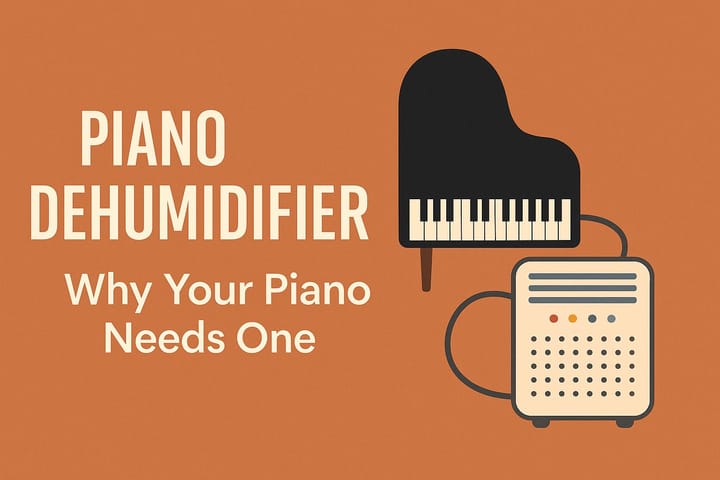Piano Humidifier: You Need To Keep Your Piano Hydrated
Protect your piano! Learn why humidity control is vital & explore piano humidifiers, dehumidifiers (like Dampp-Chaser), and maintenance tips.
A piano humidifier helps extend the life of your piano and protects all the delicate wood.
It's a great addition to your piano practice room during the winter months if you live in a climate where you're using central heat.
You might need a piano humidifier year-round if you live in a dry, warm climate. (I'm only a little jealous if you live in a place like that! :-)
Keeping the humidity level in your piano room is something that many people new to piano playing don't consider, but a piano humidifier (along with a piano dehumidifier in summer) is a small investment you can make to keep your piano in great working condition.
Your piano case, action (all the mechanics that work to connect the piano keys to the hammers that strike the string), the soundboard, the pinboard... so much is made of wood.
Wood responds to the humidity in the environment, much like other items in your home. Drawers and doors stick in high humidity as the wood swells.
Wood contracts as the air gets dryer. When wood parts need to work together, like the mechanisms inside your piano, shrinking causes problems. Joints no longer work properly, and the wood becomes less flexible and more fragile.
In extreme conditions, wood can even crack, or your piano's case can start to come apart as the glue can't hold the flexing wood.
Regulating humidity in your piano room is an often-overlooked way to keep your piano working well and keep your piano technician away from your door (except for those regular tunings, of course!).
Using a Piano Humidifier
I used to teach for our local chain of piano stores. The master technician there recommended I keep my piano room at a relative humidity of 45%.
Usually, in the winter, my house can go as low as 20% relative humidity - that's half of what's recommended!
You can use a humidity gauge, or hygrometer, to keep track of the relative humidity in your room. They're inexpensive and easy to use.
You can buy small humidifiers almost anywhere, but usually, these are made for very small rooms like bedrooms. You could certainly choose to buy more than one for a larger room, but they will definitely need to be filled more often because of their smaller size. You'll go through filters pretty fast, too.
Here are some tips on using a humidifier effectively:
- Humidifiers need to be in an open area of your room. Don't put one next to your piano, under your curtains, or next to your sofa. Make sure the vapor is blowing into the room, not onto a surface.
- Use the right size machine for the square footage of your room. Measure first! A humidifier that's too small won't be able to put enough moisture in the air.
- Humidifiers need regular cleaning -- and changing of filters, if yours uses them. Lots of little nasties can grow in that wet environment.
Another option is to look into humidifiers made for larger rooms.
Musicians all over the world love Venta humidifiers. They're air purifiers and humidifiers in one.
A Venta humidifier is certainly more pricey than the one you'll find at Walmart. But you won't have filters to change. That, in itself, will equalize the price over a year or two. But more important to me is the fact that these are the machines many professional pianists use (as well as musicians who play string instruments). If you read reviews on Venta humidifiers, you'll see lots of musicians!
Humidifiers will also help you!
Aside from having a happy piano, you'll also notice some other side effects of having a humidifier.
Humidifiers are appliances that emit water vapor into the air, increasing the relative humidity level of the surrounding environment. They can be used to help ease symptoms related to allergies or to help with dry skin.
There are several types of humidifiers, including ultrasonic, impeller, and steam vaporizers. The type of humidifier you use will depend on the severity of dry air in your home and your budget. You can also consider a dehumidifier, a device that is used to decrease the moisture levels in the air.
A humidifier can be a useful tool for combating the effects of dry air. The dry air can cause dry skin, which can be itchy and uncomfortable. A humidifier can help to keep your skin moisturized and protected from the effects of dry air. Dry air can be particularly irritating to your respiratory system, causing nosebleeds and dry coughs. Using a humidifier can help to relieve these symptoms by adding moisture to the air and making it easier to breathe.
Humidifiers can be useful for people who have asthma, as they can help to relieve the symptoms of asthma and reduce the number of flare-ups. Humidifiers are also useful for people who have allergies, as they can help to reduce the symptoms of allergies.
The type of humidifier you use will depend on the severity of dry air in your home and your budget. You can also consider a dehumidifier, a device that is used to decrease the moisture levels in the air.
How to Choose The Best Humidifier for You?
The best humidifier is the one that is good for your specific needs. Before you buy a humidifier, you should know what you want to use it for. This will help you know what features to look out for. I will give you tips on how to look at the different humidifiers in the market and make a decision.
Do you want to humidify the entire house or a particular room?
If you want to cover the whole house, get a humidifier that is meant to work in the whole house. Most of these humidifiers can cover a whole house of 3000 square feet. However, if you want to humidify a particular room, you can get a humidifier that is made for that. For example, there are humidifiers that are designed for nurseries.
Is the humidifier automatic or do you have to keep adjusting it?
Some humidifiers have automatic shut off and turn on. Also, they will have controls that you can use to set the humidity levels that you want. Some humidifiers will also have a sensor that will tell you the humidity levels in the room. This is the best kind of humidifier because you do not have to keep adjusting the controls.
Does the humidifier clean the air?
Some humidifiers will filter the water and clean the air at the same time. This is a great feature because it means that you will be breathing fresh air. Also, it is good for your health.
How much noise does it make?
If you want to use a humidifier in your bedroom, you should get one that is quiet. This is because you do not want to be disturbed at night by the noise of the machine. You can read the reviews of the humidifier to see what other buyers are saying about the noise.
Does the humidifier have a timer?
If you want to use the humidifier for a short time, you should get one with a timer. Also, you should get one that has a sleep mode. This is because you do not want to keep wasting energy when you are not in the room.
The above are some of the things that you should consider when you are looking for a humidifier. Also, you should know what your budget is. This will help you know the different brands that you can choose from.




Comments ()